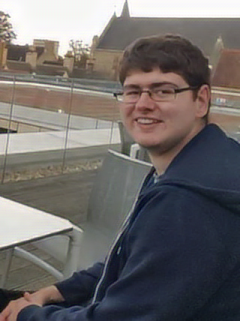Craig Robertson
We spoke with Craig Robertson, a 2016 graduate of our MMath Mathematics programme. Craig is now training to be a high school teacher.

Where are you at the moment?
So, I left Oxford at the start of the pandemic and finished my PhD remotely from Scotland; I'm still here now and I’ll be starting my new job in September. I haven’t graduated yet; I handed in my PhD thesis in September, but I got confirmation in February that I’ve passed!
In September I’ll start training to be a high School teacher through a programme offered by United Teaching. It's about getting people with PhDs into schools via a scheme called ‘Researchers into Schools’.
Teaching wasn’t really on the cards until the last couple of years. When I left my undergrad I don't think I wanted to be a teacher, but then I did my PhD and some teaching there. This was teaching MSc level students complex analysis, which I imagine was different from how it will be teaching students at high school level..
Can you tell us a bit about your time at University?
For my MMath Masters year I completed my dissertation on an area of Geometry, “the Gauss–Codazzi equations”. I had to put down four topics which interested me and I got my fourth one. I hadn’t actually done any courses in Geometry, but a lot of the people that I was friends with did and they were kind enough to share their notes with me. So, obviously, what I received was very much a crash course in the fundamentals of research level Geometry. Once I’d done that I’d fallen into the area and was there to stay.
Can you tell me a bit about what you’ve done since leaving University?
I did an MMath degree, then went straight into a PhD at the University of Oxford. I definitely think that doing it this way prepared me better. Up until the end of my fourth year as an undergraduate I didn’t even know what I wanted to do. It was a case of “I like doing maths so I’ll continue into the masters” and that then turned into a PhD.
At the highest level, my PhD was on maths, but geometry was the main area. I received my funding from the “EPSRC Centre for Doctoral Training in Partial Differential Equations: Analysis and Applications”. The title of the doctorate was, ‘On global existence for variants of Teichmüller harmonic map flow’, but the tagline I give to non-maths people is “five-dimensional goats”!
One of the chapters required a counterexample to show that solutions to this system of differential equations can degenerate like soap bubbles bursting. The setup was a five-dimensional mountain with a “goat track” carved into it, so that a goat on a fixed leash travelling down the track would stretch the leash fast enough to force the degeneration — as a Scot with a Swiss supervisor, mountains were a common language! Beyond that, my PhD was showing existence of solutions to the flow in more general settings; before, existence was only known for ordinary Euclidean space rather than in spaces like these mountains.
With regards to the pandemic, it didn’t really impact me finishing my PhD. If anything it gave me more time to work on my maths and finish it. I was able to meet with my supervisor online and such, so my work wasn’t effected. Socially it was more of a problem, like it was for everybody else, and it definitely hampered me when I went into the job market. It was smaller than it would otherwise have been. It did take me a while, but after a few months I was able to find work so I’d say there’s always a light at the end of the tunnel.
Do you have any words of wisdom for our students?
To get through a PhD is something you need to want to do, because it's a big project; it involves a lot of hard work. This and picking the right research topic are the two most important things in my opinion. This is the next three years of your life!
While doing this, it’s important that you take the time to step away and socialise, or go for walks to clear your head. You can’t just stay in your room for years doing nothing but Maths, it’s not sustainable and you’ll get burnt out.
It’s also important to appreciate that some things simply won’t work out. You’ll spend months trying to prove something, only to find that the statement is false. You need to be able to deal with that and have a back-up plan ready to go

